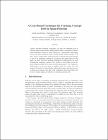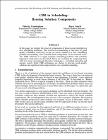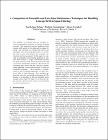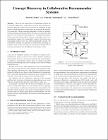Browsing Computer Science Technical Reports by Title
Now showing items 41-60 of 280
-
Case-Based Plan Recognition in Computer Games
(Trinity College Dublin, Department of Computer Science, 2003)In this paper we explore the use of case-based plan recognition to predict a player?s actions in a computer game. The game we work with is the classic Space Invaders game and we show that case-based plan recognition ... -
Case-Based Reasoning in Scheduling: Reusing Solution Components
(Trinity College Dublin, Department of Computer Science, 1996-08)In this paper we explore the reuse of components of known good schedules in new scheduling problems. This involves accumulating a case-base of good quality schedules, retrieving a case (or cases) similar to a new scheduling ... -
A Case-Based Reasoning View of Automated Collaborative Filtering
(Trinity College Dublin, Department of Computer Science, 2001-03)From some perspectives Automated Collaborative Filtering (ACF) appears quite similar to Case-Based Reasoning (CBR). It works on data organised around users and assets that might be considered case descriptions. In addition, ... -
A Case-Based Technique for Tracking Concept Drift in Spam Filtering
(Trinity College Dublin, Department of Computer Science, 2004-08-17)Clearly, machine learning techiques can play an important role in filtering spam email because ample training data is available to build a robust classifier. However, spam filtering is a particularly challenging task as ... -
Case-Based Travel Agent
(Trinity College (Dublin, Ireland). School of Computer Science & Statistics, 1999-09)With the explosion of the Internet, we are getting more and more information and it becomes difficult to digest. Agents exist to help the users. An agent is a component of software (or hardware) that is capable of ... -
Case-based User Profiling in a Personal Travel Assistant
(Trinity College Dublin, Department of Computer Science, 1999-03)[Introduction] In this paper we present an architecture for a Personal Travel Assistant (PTA). We focus on the ability of this PTA to elaborate a user?s travel requirements and evaluate offers. These decisions are based ... -
CASSANDRA : A Collaborative Anti Spam System Allowing Node Decentralised Research Algorithms
(Trinity College (Dublin, Ireland). School of Computer Science & Statistics, 2003-09)Email has become a critical tool in many people's lives, both professionally and personally. It is easily accessible, inexpensive, fast, versatile and is far-reaching both in terms of the number and spectrum of people to ... -
CBR in Scheduling: Reusing Solution Components
(Trinity College Dublin, Department of Computer Science, 1995-06)In this paper we explore the reuse of components of known good schedules in new scheduling problems. This involves accumulating a case-base of good quality schedules, retrieving a case (or cases) similar to a new ... -
CBR Net :- Smart Technology over a Network
(Trinity College Dublin, Department of Computer Science, 1998-06)CBR (case-based reasoning) has considerable potential for developing intelligent assistants for the World Wide Web. We examine intelligent applications already existent online and find that they can be divided into agent ... -
Class Noise and Supervised Learning in Medical Domains: The Effect of Feature Extraction
(Trinity College Dublin, Department of Computer Science, 2006)Inductive learning systems have been successfully applied in a number of medical domains. It is generally accepted that the highest accuracy results that an inductive learning system can achieve depend on the quality ... -
Clock Synchronization for Multi-hop Ad hoc Networks
(Trinity College Dublin. Department of Computer Science, 2003-09)Clock syncronization is one of the basic requirements of a distributed real-time systems. The greater the precision achievable by the clock synchronization algorithm used, the harder the real-time guarantees that can be ... -
Code Generation with ?Visual Modeller?
(Trinity College Dublin, Department of Computer Science, 1997)?Visual Modeller? is a CASE tool that permits end-users to model business processes, using the associated method ?Visual Modelling?. It is also able to generate the database and a ?front-end? application from this model. ... -
The Cognitive Processes Underlying Complex Analogies: Theoretical and Empirical Advances
(Trinity College Dublin, Department of Computer Science, 1993-10)The psychological investigation of complex analogies (like the solar system / atom analogy) began in the late 1970s and in the intervening period has grown into a prototypical, area of Cognitive Science research. During ... -
Collaborative Ad-hoc Applications
(Trinity College Dublin. Department of Computer Science, 2000-09)The proliferation of mobile hand-held devises and the development of ad-hoc networking technologies has opened the possibility for users of these devises to partake in collaborative applications with other mobile users. ... -
A Comparison of Ensemble and Case-Base Maintenance Techniques for Handling Concept Drift in Spam Filtering
(Trinity College Dublin, Department of Computer Science, 2005)The problem of concept drift has recently received considerable attention in machine learning research. One important practical problem where concept drift needs to be addressed is spam filtering. The literature on ... -
A Comparison of Incremental Case-Based Reasoning and Inductive Learning
(Trinity College Dublin, Department of Computer Science, 1994-11)This paper focuses on problems where the reuse of old solutions seems appropriate but the conventional CBR methodology is not adequate because a complete description of the new problem is not available to trigger ... -
A Comparison of Model-Based and Incremental Case-Based Approaches to Electronic Fault Diagnosis
(Trinity College Dublin, Department of Computer Science, 1994-12)CBR seems well suited to fault diagnosis because diagnostic episodes naturally form cases and much of expert competence seems to be based on reuse of old solutions. However, in many diagnosis problems it is difficult ... -
Complexity of Adaptation in Real-World Case-Based Reasoning Systems
(Trinity College Dublin, Department of Computer Science, 1993-09)The essence of Case-Based Reasoning (CBR) as a problem solving paradigm is that solutions are generated by adapting the solutions of similar problems rather than solving the problem from first principles. In this paper ... -
Concept Discovery in Collaborative Recommender Systems
(Trinity College Dublin, Department of Computer Science, 2003-09-06)There are two main types of recommender systems for e-commerce applications: content-based systems and automated collaborative filtering systems. We are interested in combining the best features of both approaches. In ... -
Conceptual Scoffolding: A Spatially-founded Meaning Representation for Metaphor Comprehension
(Trinity College Dublin, Department of Computer Science, 1992-04)Once viewed as a rhetorical and superficial language phenomenon, metaphor is now recognized to serve a fundamental role in our conceptual structuring and language comprehension processes. In particular, it is argued that ...























